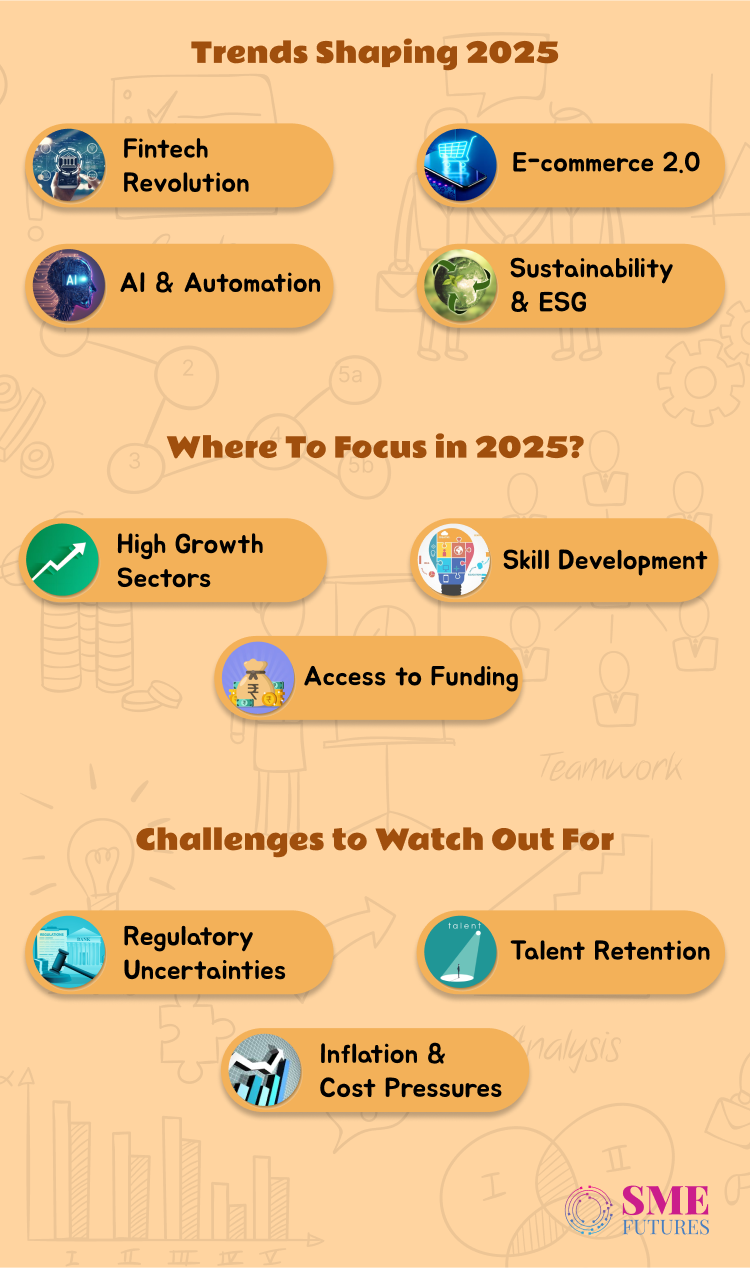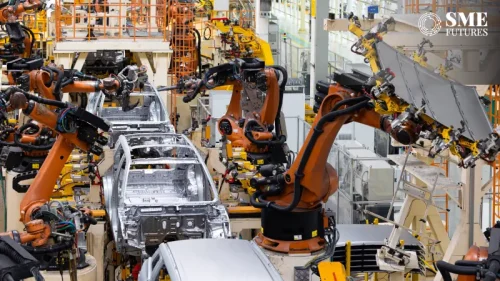The Indian business landscape is on the brink of a revolution. As we approach 2025, a wave of technological innovation, sustainability-driven policies, and shifting consumer behaviour is reshaping industries. For entrepreneurs, this is both an exciting and challenging time. The key to success? Staying ahead of the curve.
India’s business environment in 2025
India’s economy is poised for robust growth in 2025, with a projected GDP growth rate of 6.5 per cent-7 per cent. This growth will be driven by a combination of domestic demand, government initiatives, and global trends. But what does this mean for entrepreneurs?
The upcoming Budget 2025 is expected to be a game-changer, with reforms aimed at boosting MSMEs, fostering innovation, and accelerating India’s transition to a green economy. Hardika Shah, Founder and CEO of Kinara Capital, says, “2025 will be a year of transformative growth, but only for those who are prepared to embrace change and innovate.”
The trends shaping 2025
AI and Automation
Artificial Intelligence (AI) is no longer a futuristic concept—it’s here, and it’s transforming businesses across industries. From automating repetitive tasks to enabling data-driven decision-making, AI is becoming a cornerstone of business strategy.
Varun Jairath, Founder and CEO of Herbal Chakra, asserts, “AI-powered systems have unlocked efficiencies and enabled us to scale rapidly while delivering exceptional customer experiences. Over the next decade, AI will drive hyper-personalisation, predictive analytics, and smarter decision-making. Blockchain, with its transparency and security, is set to revolutionise supply chains and financial transactions, particularly in industries like logistics and finance. IoT-powered ecosystems will enable real-time monitoring and automation, helping businesses stay ahead of the curve.”
For MSMEs, AI offers a unique opportunity to level the playing field. Bruce Keith, CEO and Co-founder of InvestorAI, emphasises, “The next wave of winners will be those who can seamlessly integrate AI into their operations. AI should work in conjunction with humans—not replace them. Real-life examples include stock selection and portfolio construction outperforming indices regularly, identifying customers-at-risk nine months before they leave, and providing self-service journeys with a guide or guru to help educate users and provide the tools to figure out what they should be doing.”
Sustainability: New business imperative
Sustainability is no longer just a buzzword—it’s a business imperative. With India committing to net-zero emissions by 2070, businesses are under increasing pressure to adopt eco-friendly practises.
Rajesh Patel, Co-founder & CEO of Snowkap, explains, “ESG and sustainability practises are becoming central to business strategies. The introduction of SEBI’s Business Responsibility and Sustainability Report (BRSR) has mandated greater transparency and accountability in ESG disclosures. Investors are increasingly focusing on ESG factors as indicators of long-term value and risk mitigation. Many Indian companies, particularly large firms, have set explicit sustainability goals, with a significant number successfully integrating ESG into their core strategies.”
The demand for green financing is also on the rise. Shah notes, “Tailored financial solutions, such as green financing for solar products, will play a critical role in driving climate action initiatives. India’s NDC targets require financing to the tune of USD 2.5 trillion, and MSMEs have a significant role to play. I am confident that 2025 will see a rise in focused financing products that will not only bridge the credit gap for MSMEs but also drive transformative growth across the sector.”
E-commerce 2.0 is next frontier
E-commerce in India is set to reach new heights, driven by growth in Tier 2 and Tier 3 cities. Social commerce and hyperlocal delivery models are redefining the online retail experience. However, challenges in logistics and last-mile delivery remain.
Entrepreneurs must focus on building robust supply chains and leveraging technology to enhance customer experiences. Manish Aggarwal, CEO & Founder of FINQY, says, “The next leap in digital payments will be about creating personalised experiences powered by AI and machine learning. Businesses that anticipate customer needs will thrive. It’s no longer just about enabling transactions; it’s about creating personalised experiences powered by AI and machine learning. Businesses will soon be able to anticipate customer needs and deliver seamless, real-time payment solutions that go beyond convenience.”
FinTech revolution
The FinTech revolution is reshaping India’s financial landscape. Aggarwal predicts, “2025 will be a transformative year for digital payments, neobanking, and cross-border payment solutions. Technologies like blockchain and DeFi will simplify international transactions, unlocking opportunities for global expansion. Cross-border payments, traditionally a pain point for many businesses, are set to become faster, more transparent, and affordable. This is a huge boost for Indian entrepreneurs and businesses eyeing global expansion.”
Neobanks are also empowering MSMEs with intuitive financial tools. “Digital-first banking platforms are enabling small businesses to access working capital, intuitive money management tools, or the ability to automate their financial processes. Neobanks are stepping in to bridge the gaps left by legacy systems,” Aggarwal adds.

Opportunities for entrepreneurs: Where to focus in 2025
High growth sectors: EdTech, HealthTech, AgriTech, and SpaceTech
EdTech, HealthTech, AgriTech, and SpaceTech are emerging as high-growth sectors. Sujit Jagirdar, Interim CEO of T-Hub, contends, “Start-ups leveraging AI, blockchain, and IoT are solving complex challenges across industries. Collaboration with corporates and government bodies will amplify their impact. As Indian start-ups increasingly target global markets, understanding cross-border compliance, localised strategies, and international market dynamics will be critical for success.”
Skill development
As industries evolve, so do skill requirements. Entrepreneurs must invest in upskilling their workforce to stay competitive.
Nilesh Dungarwal, Co-founder and CEO of WorkIndia, emphasising the importance of vocational training, says, “Skill development is key to addressing the demand-supply gap in India’s blue-collar workforce. With industries like logistics, e-commerce, and manufacturing evolving rapidly, workers must adapt to changing requirements. Partnerships between corporates, educational institutions, and government bodies are essential to designing targeted training programmes that align with specific industry needs.”
Access to funding
The funding landscape in 2025 will favour start-ups with robust business models and clear paths to profitability.
Jagirdar notes, “Investors are increasingly focusing on ESG-compliant start-ups and sectors like climate tech and health tech. Entrepreneurs must demonstrate financial discipline and a strong value proposition to attract funding. The funding landscape for start-ups in 2025 will likely see a stronger emphasis on sustainability, sector-specific investments, profitability, and alternative funding options.”
Challenges to watch out for
Regulatory uncertainties
Navigating the evolving regulatory landscape, especially in sectors like FinTech and healthcare, will be a key challenge. Entrepreneurs must stay informed and proactive in addressing compliance requirements.
Talent retention
With rising competition for skilled talent, start-ups must prioritise employee-centric cultures and invest in talent development programmes.
Sanjith Shetty, Founder and CEO of Miror, advises, “Cultivate a culture that values purpose and inclusivity. Empower employees to make a difference, and productivity will follow. Gen Z is redefining work by seeking meaningful engagement and purpose in their careers. As entrepreneurs, we have an opportunity to align our organisational values with theirs.”
Inflation and cost pressures
Inflation and rising operational costs are concerns for businesses of all sizes. Entrepreneurs must focus on optimising costs and improving efficiency to maintain profitability.
Future belongs to the bold
The year 2025 promises to be transformative for India’s entrepreneurial ecosystem. From AI-driven innovation to sustainability and FinTech advancements, the opportunities are immense. However, success will depend on adaptability, resilience, and a forward-thinking approach.
As Shah aptly puts it, “Scaling women’s participation in the workforce and encouraging entrepreneurship are critical for India’s growth. Currently, although women form nearly half of the population, their contribution to the GDP is just 18 per cent. Encouraging entrepreneurship requires access to resources, particularly capital. Formal capital is a powerful catalyst for growth, as we have witnessed firsthand through our HerVikas programme for women entrepreneurs.”











